A Journey Through Divine Realms
Top Ten Temples Devoted to Lord Krishna:
This Friday, May 24th, 2024, our spiritual voyage brings us to the magnificent temples dedicated to Lord Krishna. Renowned for their divine aura, architectural splendor, and deep-rooted cultural significance, these temples embody the eternal devotion to Lord Krishna. Each site we visit today reveals a rich tapestry of history, spirituality, and tradition, making them vibrant centers of worship and cultural heritage.
In Hinduism, temples serve as focal points for worship and community life, with each deity revered through various rituals and ceremonies. Lord Krishna, known for his divine playfulness and profound teachings, is worshipped with immense devotion across India. These temples become epicenters of major festivals and daily worship, drawing devotees from all corners to participate in a rich spiritual and cultural experience.
Join us as we explore the top ten Lord Krishna temples, discovering their historical significance, architectural beauty, and the profound impact they have on their devotees’ lives.
Sri Krishna Temple, Guruvayur, Kerala
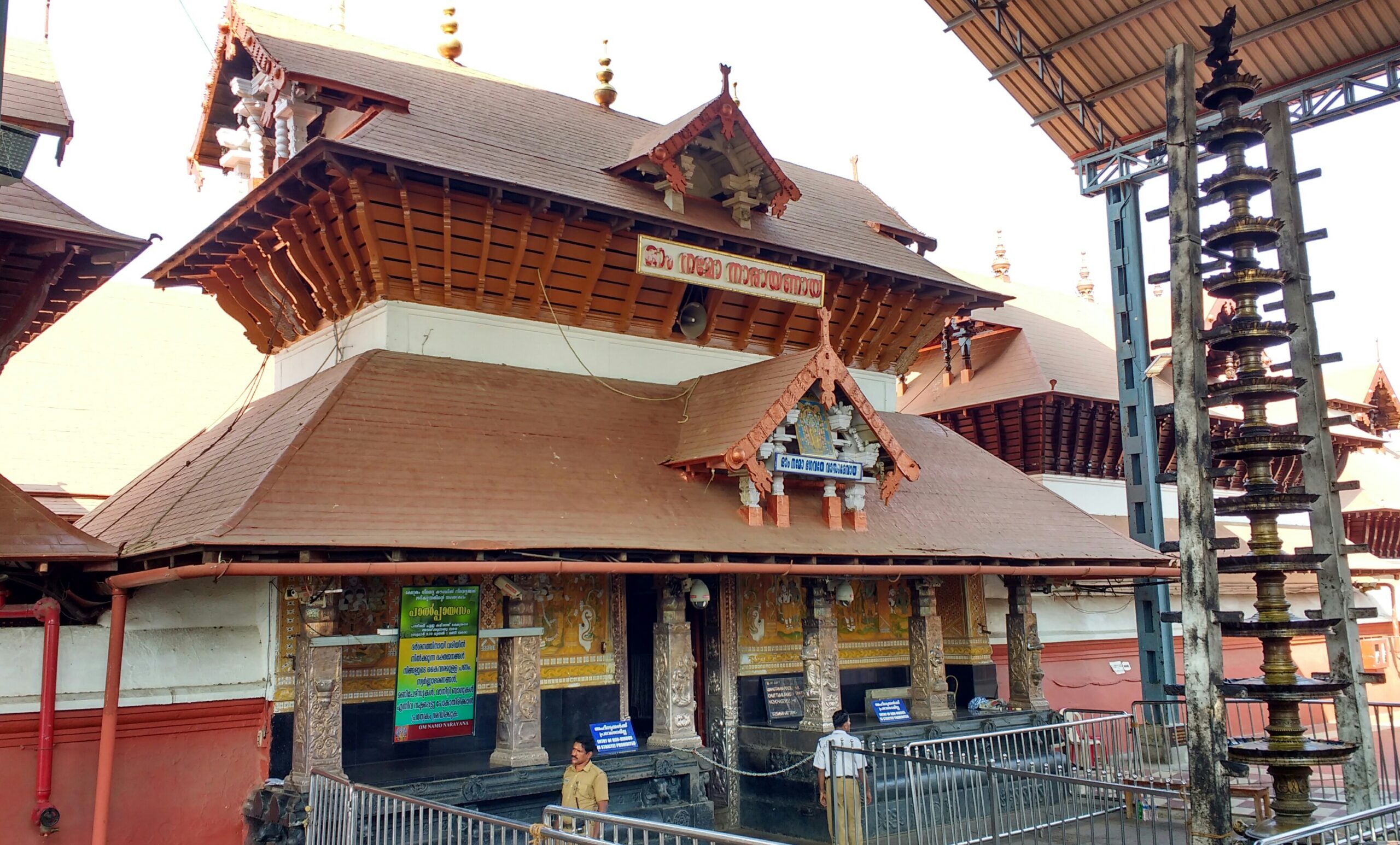
Image Credit https://flickr.com
History, Architecture, and Festivals
Believed to be over 5000 years old, the Guruvayur Temple’s current structure was completed in the 16th century. The temple features traditional Kerala-style architecture with a gold-plated Dwajasthambam (flagpost) and intricate wooden carvings. Lord Krishna, worshipped as Guruvayurappan, is the main deity. The annual Guruvayur Ekadasi festival is one of the most significant events, attracting pilgrims from all over.
The Guruvayur Temple serves as a cultural hub, where traditional performances like Krishnanattam (a dance drama depicting the life of Krishna) are held, drawing cultural enthusiasts and devotees alike. The local community actively participates in the temple’s daily rituals, ensuring that the centuries-old traditions are preserved and passed on to future generations.
Accessibility
Located about 29 kilometers from Thrissur Railway Station, the temple is easily accessible. The temple premises resonate with the rhythmic beats of drums, the sight of oil lamps, and the fragrance of flowers, offering a sensory feast to devotees.
Banke Bihari Temple, Vrindavan, Uttar Pradesh
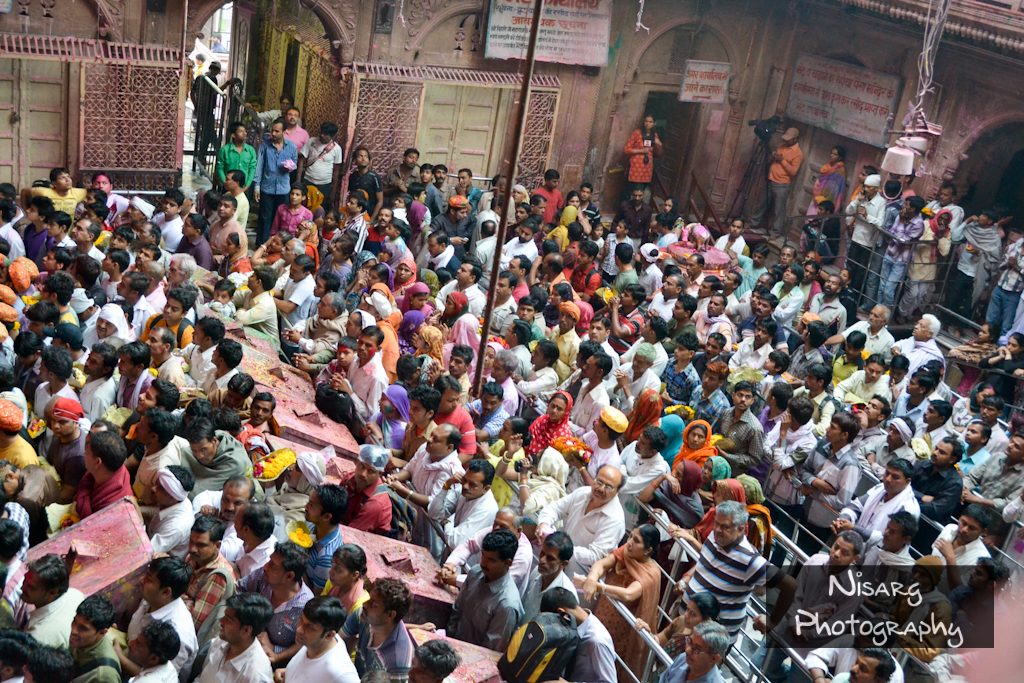
Image Credit https://flickr.com
History, Architecture, and Festivals
Constructed in 1864 by Swami Haridas, the Banke Bihari Temple is an exemplary piece of Rajasthani architecture, featuring intricate stone carvings and a vibrant courtyard. The deity here is Lord Krishna in his child form, known as Banke Bihari. The temple is especially famous for its lively Holi celebrations, where devotees immerse themselves in colors and devotion.
In Vrindavan, the Banke Bihari Temple’s unique practice of Jhulan Yatra, where swings are decorated for the deities during the monsoon season, exemplifies deep community involvement. Devotees from nearby areas handcraft the decorations and participate wholeheartedly in the festivities, embodying a shared spiritual life.
Accessibility
The nearest railway station is Mathura Junction, approximately 12 kilometers away. The temple is alive with the sounds of bhajans, the sight of colorful garlands, and the sweet scent of rose petals.
Krishna Janmabhoomi Temple, Mathura
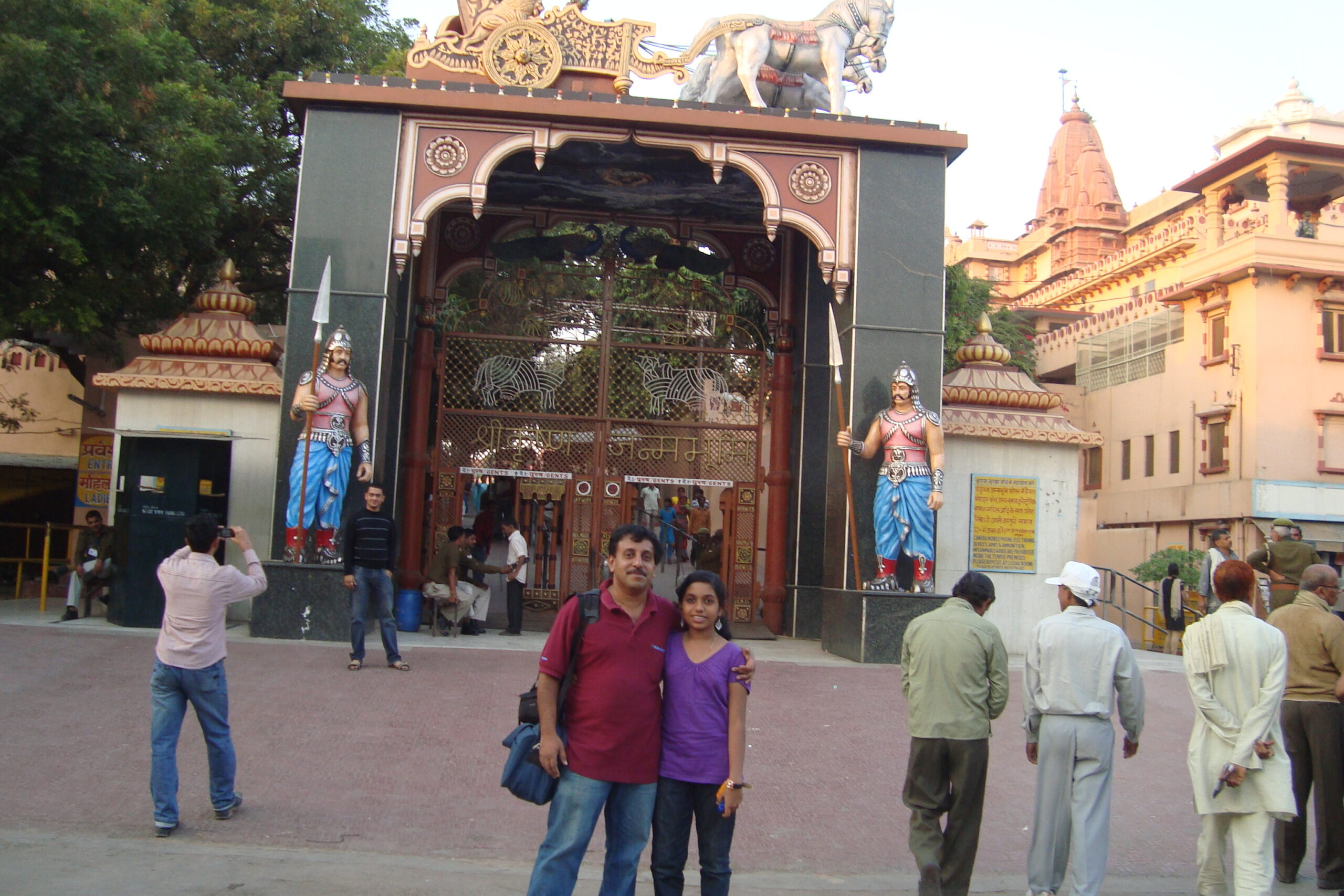
Image Credit https://flickr.com
History, Architecture, and Festivals
Believed to be the birthplace of Lord Krishna, the Krishna Janmabhoomi Temple’s present structure was rebuilt in the 20th century. It showcases a blend of traditional and modern architectural styles. Lord Krishna, celebrated here as Kanha, is the central deity. Janmashtami is celebrated with great devotion and enthusiasm.
At Krishna Janmabhoomi, the community gathers for elaborate re-enactments of Krishna’s lila (divine plays) during Janmashtami, which are a significant cultural draw. Local artisans and performers come together to create a vibrant tableau, which enhances the festive atmosphere and draws spiritual tourists from around the world.
Accessibility
The temple is easily accessible from Mathura Junction, just 1 kilometer away. The sacred chants, the sight of the magnificent Krishna idol, and the aroma of burning camphor create a deeply spiritual atmosphere.
ISKCON Temple, Bengaluru, Karnataka
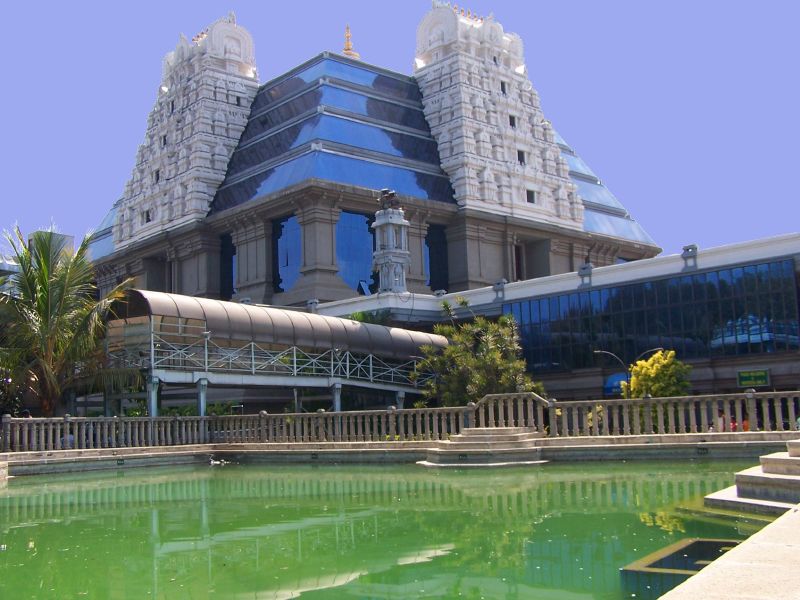
Image Credit https://flickr.com
As we move from the historic city of Mathura, we transition to the modern spiritual enclave of Bengaluru’s ISKCON Temple, where devotion meets architectural grandeur.
History, Architecture, and Festivals
Inaugurated in 1997, the ISKCON Temple in Bengaluru is a modern architectural marvel with a mix of Dravidian and contemporary styles, featuring grand archways and intricate carvings. Lord Krishna, along with Radha, is worshipped here. The temple’s Krishna Janmashtami celebrations are renowned for their grandeur.
The ISKCON Temple in Bengaluru is renowned for its Sunday Feasts, a tradition initiated by the founder of ISKCON, where community members prepare and share a large feast. This event fosters a sense of community and belonging, bridging cultural gaps and bringing people together in devotion and fellowship.
Personal experience of this author is that the khichadi they serve as prasadam to too good to miss. The street market within the temple complex is too good to miss as well
Accessibility
Located about 7 kilometers from Bengaluru City Railway Station, the temple is easily reachable. The ambiance is filled with melodious kirtans, the sight of beautifully decorated deities, and the fragrance of sandalwood.
Udupi Sri Krishna Matha, Karnataka
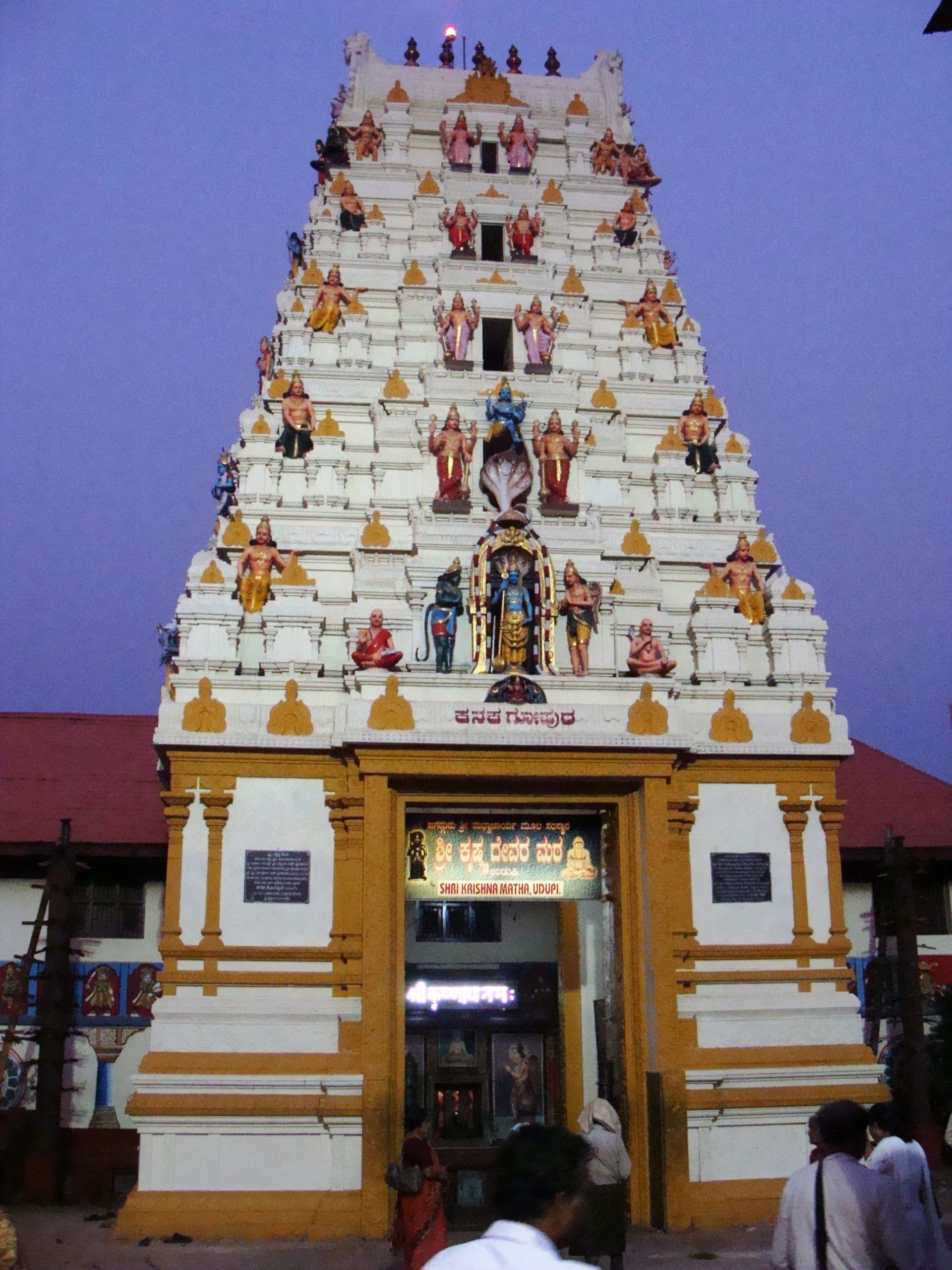
Image Credit https://flickr.com
Next, we journey from the bustling city of Bengaluru to the tranquil town of Udupi, where the Sri Krishna Matha offers a unique glimpse into the ritualistic beauty of Hindu worship.
History, Architecture, and Festivals
Founded in the 13th century by Saint Madhvacharya, Udupi Sri Krishna Matha features traditional South Indian architecture with a unique kanakana kindi (a small window through which the deity is worshipped). Lord Krishna, worshipped here in a child form, is the central figure. Krishna Janmashtami is celebrated with great devotion and joy.
Udupi Sri Krishna Matha is famous for its Paryaya festival, a unique ritual held every two years where different religious sects assume the management of the temple—a tradition that showcases the unity and diversity within the Hindu community. This event is a major attraction and involves the whole town in celebrations and rituals.
Accessibility
The nearest railway station is Udupi, about 4 kilometers away. The temple’s serene environment, the sight of beautifully adorned deities, and the aroma of prasadam create an enriching spiritual experience.
Prem Mandir, Vrindavan, Uttar Pradesh
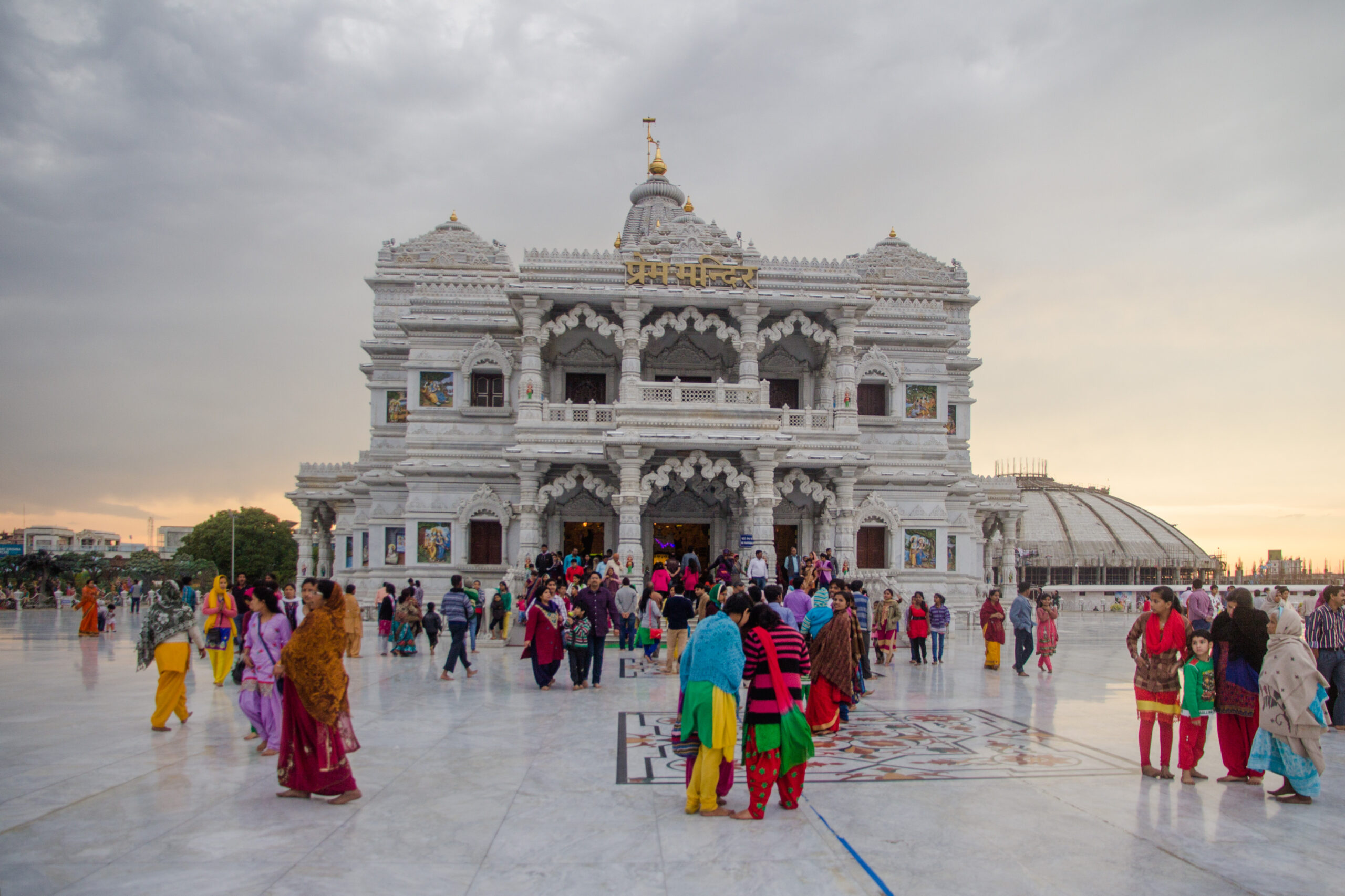
Image Credit https://flickr.com
From the traditional rituals of Udupi, we travel back to the divine playfulness at Vrindavan’s Prem Mandir, where spirituality and modernity blend seamlessly.
History, Architecture, and Festivals
Inaugurated in 2012 by Jagadguru Shri Kripalu Ji Maharaj, Prem Mandir is a modern architectural wonder, built entirely of white marble with intricate carvings. The main deities are Radha and Krishna. The temple’s elaborate light shows and musical fountains are major attractions.
Prem Mandir is known for its community-driven efforts in education and healthcare, providing free services to the locals. During festivals, volunteers from the community manage crowds and offer services, showing the temple’s role in social welfare beyond spiritual activities.
Accessibility
The nearest railway station is Mathura Junction, approximately 12 kilometers away. The ambiance is vibrant with devotional songs, the sight of illuminated sculptures, and the fragrance of blooming flowers.
Vitthal Temple, Pandharpur, Maharashtra
Pandharpur Palkhi Festival: A Journey of Devotion and Unity
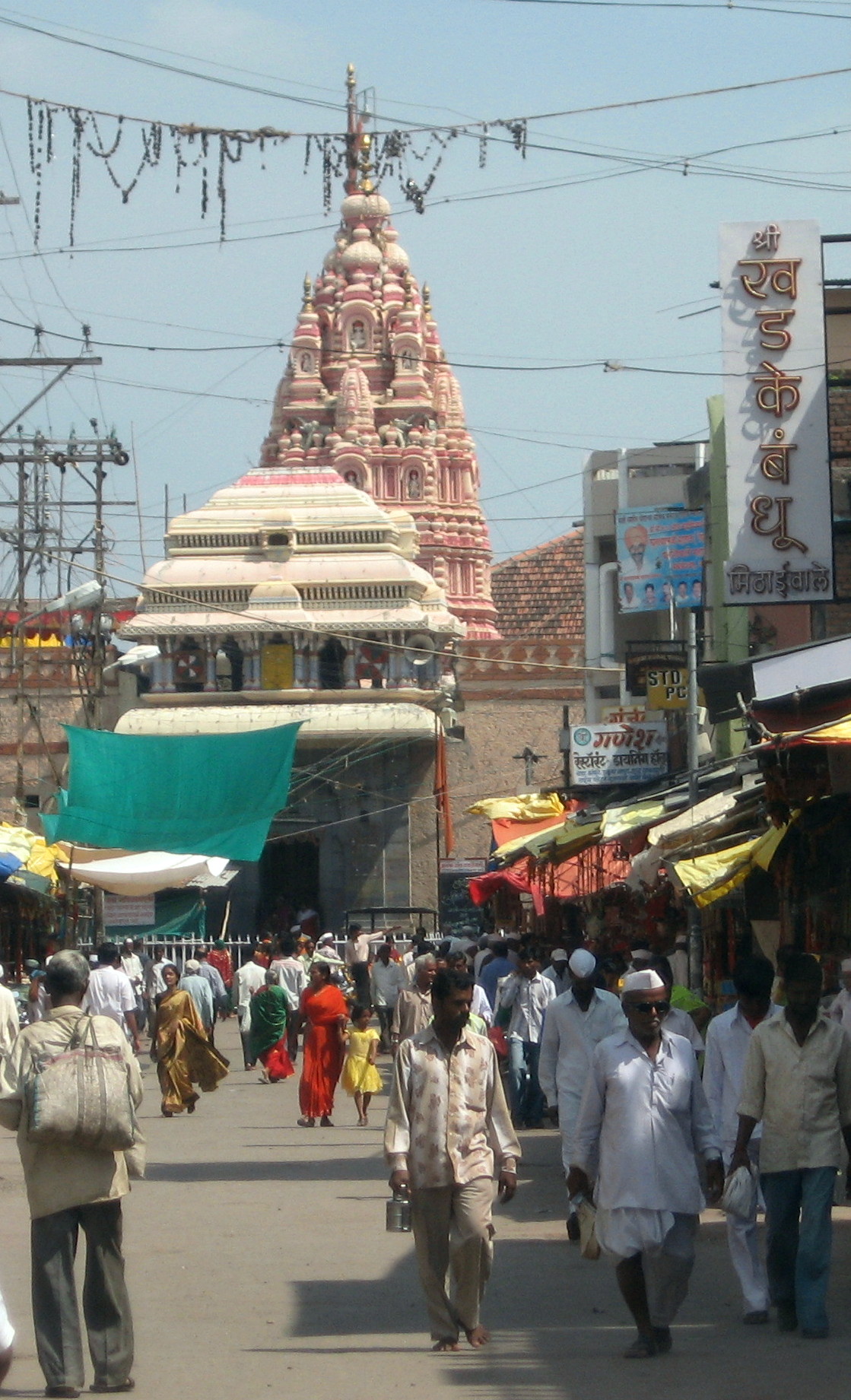
Image Credit https://flickr.com
Leaving the marble splendor of Prem Mandir, our pilgrimage takes us to the historic Vitthal Temple in Pandharpur, celebrated for its massive communal gatherings and vibrant spiritual energy.
History, Architecture, and Festivals
Dating back to the 12th century, the Vitthal Temple showcases Hemadpanthi architectural style with its basalt stone construction and intricate carvings. Lord Krishna, worshipped as Vitthal, is the central deity. The Ashadi Ekadashi festival sees lakhs of devotees congregating for the annual pilgrimage.
The annual pilgrimage to Vitthal Temple, known as Waari, sees a massive gathering of devotees from all walks of life, who travel on foot singing devotional songs. This event is a testament to the temple’s influence in fostering a deep sense of community and spiritual kinship among its followers.
Accessibility
Pandharpur Railway Station is about 2 kilometers from the temple. The chants of “Vithoba,” the sight of devout pilgrims, and the scent of holy basil fill the air with spirituality.
Radha Raman Temple, Vrindavan, Uttar Pradesh
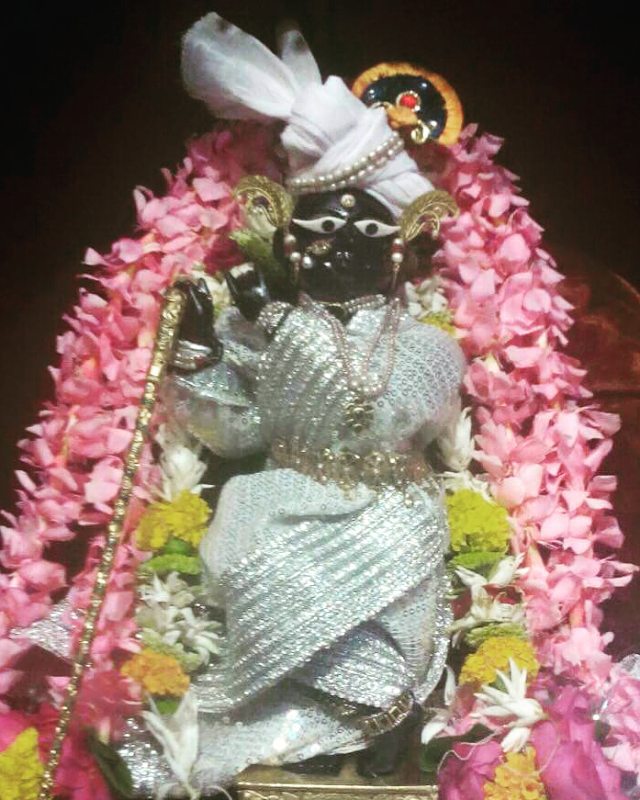
Image Credit https://flickr.com
We depart from the lively chants at Pandharpur to find solace in the intimate and mystic ambiance of Vrindavan’s Radha Raman Temple, where every stone tells a story of devotion.
History, Architecture, and Festivals
Built in 1542 by Gopal Bhatt Goswami, the Radha Raman Temple is known for its intricate stone carvings and the self-manifested deity of Radha Raman. The deity, Radha Raman, is an incarnation of Krishna. The temple is known for its joyous Janmashtami celebrations.
At Radha Raman Temple, the local community’s involvement can be seen in the daily seva (service) offered by the families who have lived there for generations. These families play a crucial role in maintaining the temple rituals and teachings, providing a living lineage of devotion.
Accessibility
Located about 10 kilometers from Mathura Junction, the temple is accessible and welcomes devotees with the sounds of bhajans, the sight of beautifully decorated idols, and the smell of incense.
Srinathji Temple, Nathdwara, Rajasthan
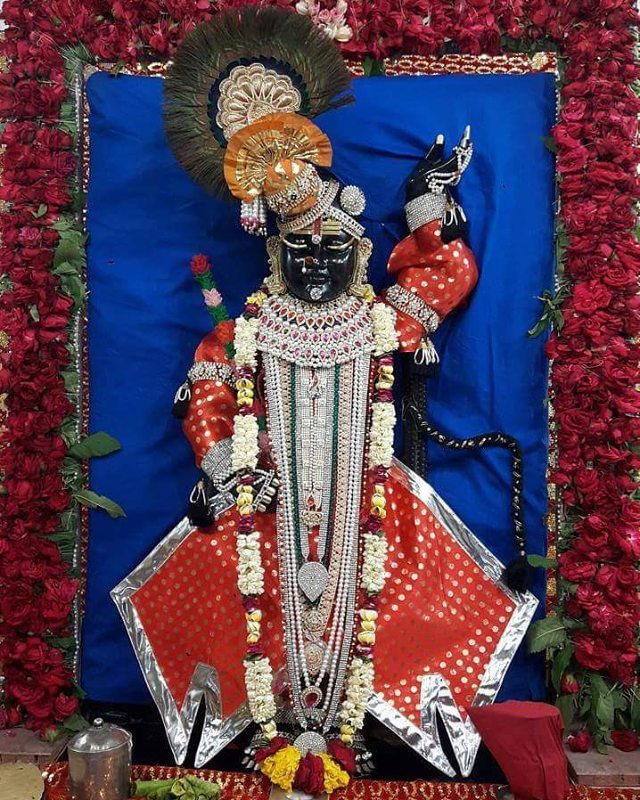
Image Credit https://flickr.com
Continuing our journey through the divine landscapes, we head to the majestic Srinathji Temple in Nathdwara, where art and worship converge in a spectacular celebration of Krishna.
History, Architecture, and Festivals
The Srinathji Temple, dating back to the 17th century, was built by Maharana Raj Singh of Mewar. It showcases splendid Rajput architecture with exquisite paintings and sculptures. The main deity, Lord Krishna, is worshipped as Srinathji. The temple is famous for its Annakut festival, where a grand feast is offered to the deity.
The community around Srinathji Temple is integral to the preparation of the offerings and the elaborate sewa routines, which include intricate dressings and decorations of the deity. Local artisans dedicate their craft to the temple, creating garments and jewelry that reflect their devotion.
Accessibility
The nearest railway station is Udaipur, approximately 45 kilometers away. The temple exudes an aura of devotion with the sounds of temple bells, the sight of colorful attire of the deity, and the fragrance of freshly cooked prasadam.
Jugal Kishore Temple, Vrindavan, Uttar Pradesh
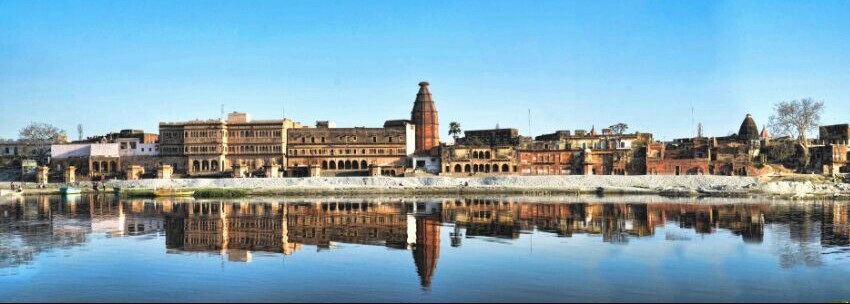
Image Credit https://wikipedia.org
As we near the end of our spiritual voyage, we move from the artistic heritage of Nathdwara to the ancient sanctity of Jugal Kishore Temple in Vrindavan, where the past and present of Krishna’s tales come alive. This also forms a part of Top Ten Lord Krishna Temples.
History, Architecture, and Festivals
Constructed in 1627 by the Mughal emperor Jahangir, the Jugal Kishore Temple is one of the oldest temples in Vrindavan, showcasing Mughal and Hindu architectural styles. The main deities, Radha and Krishna, are worshipped here. The temple is particularly vibrant during the Jhulan Yatra festival, where swings adorned with flowers are prepared for the deities.
During the festival of Jhulan Yatra, the community around Jugal Kishore Temple comes together to decorate the temple complex with flowers and lights. The festival culminates in a community feast, which highlights the temple’s role as a center for social and religious gatherings.
Accessibility
The nearest railway station is Mathura Junction, about 12 kilometers away. The temple atmosphere is filled with the melodious tunes of bhajans, the sight of beautifully decorated swings, and the scent of jasmine flowers.
Reflections on Top Ten Temples of Lord Krishna
Exploring these ten revered temples dedicated to Lord Krishna offers a glimpse into the profound spiritual and cultural heritage of India. Each temple, with its unique history, architectural beauty, and deep-rooted traditions, stands as a testament to the enduring devotion to Lord Krishna. These sacred sites not only provide a sanctuary for worship but also inspire and uplift the spirits of all who visit, reminding us of the timeless teachings and divine play of Lord Krishna.
Feature Image: Click here to view the image. [Credit https://flickr.com]
#LordKrishna #KrishnaTemples #SpiritualJourneys #HinduTemples #IndianHeritage #DevotionalDestinations #KrishnaBhakti #LordKrishnaTemples #HinduTemples #SpiritualIndia #TempleArchitecture #PilgrimageSites


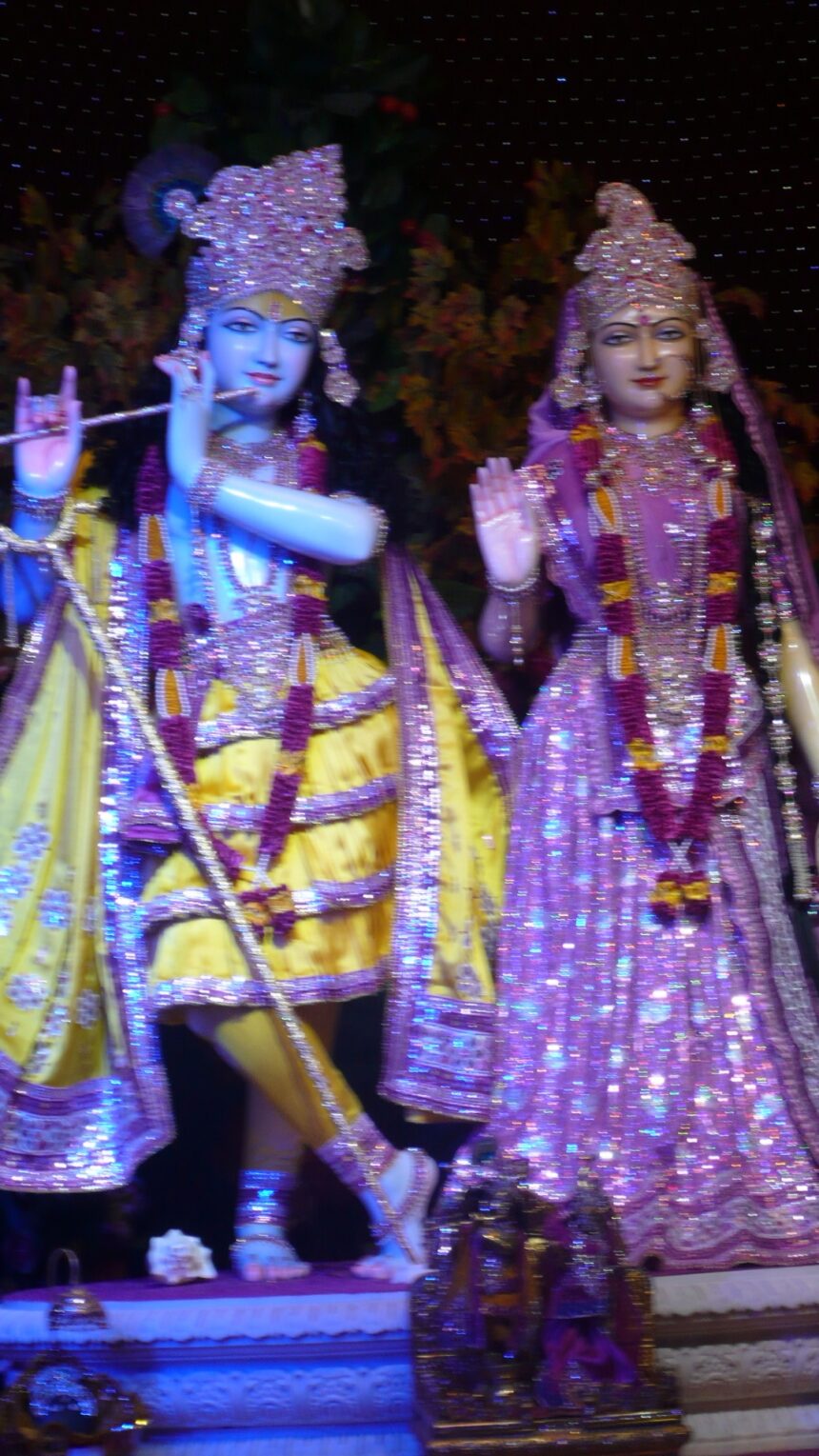
Leave a Reply